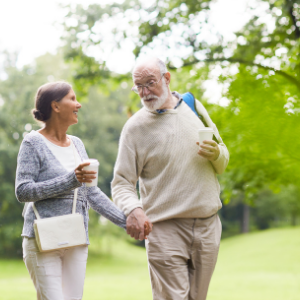
May is National Walking Month. Walking is proven to be good for our minds, our bodies and our neighbourhoods and has been a lifeline during the past year, helping people stay active and connected during COVID-19 lockdowns. That’s why we want everyone to keep going and pledge to walk more this May!
(As always, when we say walking, we include people who use wheelchairs or other mobility aids.)
How will walking make me healthier?
A US report in 2018 concluded that walking is associated with improved mental and neurological health. Just adding 20 minutes of walking to your daily routine can lead to:
- Fewer symptoms of depression
- Reduced feelings of anxiety
- Improved cognitive function
- Improved quality of life
- Improved sleep quality
- Reduced risk of dementia
Just being outside and moving around can boost your mental wellbeing during these strange times we’re living through, whilst also keeping you connected to your local community.
Be sure to wave hello and share a smile with people you see. It might sound simple, but these small acts of kindness can really lift someone’s spirits.
Walking is also an easy, free way to get fitter – it can encourage mobility and reduce the risks of falls, improve heart health and blood pressure, burn calories and increases metabolism, and improve muscle tone and strength.
To make the most of the health benefits of walking, try to walk at a speed at which your breathing rate and heartbeat increase but you can still carry on a conversation.
Walking routes around CNTW sites
To help our staff and service users stay active, last year we launched signposted walking routes at many of our sites. These are all between 1-1.25 miles, or about 20-30 minutes of walking.
These are the walking routes currently signposted on our sites:
St Nicholas Hospital – blue route
St Nicholas Hospital – yellow route
St George’s Park – yellow route
Hopewood Park – blue route
Hopewood Park – yellow route
Walkergate Park
Dr James Hecker, Innovative Speciality Doctor at CNTW, took part in the walk launch at Monkwearmouth Hospital. He said: “Just 10 minutes of brisk walking a day can reduce the risk of diabetes, coronary heart disease and some cancers. And even for those that cannot walk at a brisk pace, we know that any extra movement matters.
“During the walk there were many people travelling at different paces, but we all learned that just a small amount of increased movement beyond what is normal for each person can have a number of health benefits.
“We positively encourage staff to take regular daily walk breaks.”
You can also make a pledge to #WalkThisMay to be entered into the Living Streets prize draw! Based on your pledge, Living Streets will then show you how many miles you’ll walk, how many calories you’ll burn and how much CO2 you’ll save across the month compared to if you were driving those trips.
- Walking is a great way to spend quality time with loved ones. And you can all get fitter at the same time. Competition can be a big motivator. See who can stick to the Living Streets #Try20 challenge (20 minutes of walking per day) all month!
- Capturing moments makes walking even more interesting. Take your smart phone or camera along and snap your local park, sunset or town centre. See how many hidden treasures you can find in your local area.
- Download the Living Streets scavenger hunt to spot interesting things in your neighbourhood.
- Try to find some green on your walk, whether that’s at a park or some tree-lined streets. Listen out for different types of bird song, and if you have little ones, why not count how many different things you see? (Connecting with nature also has proven benefits for your mental wellbeing.)
- Walking is a great opportunity to practice some mindfulness. Take time for yourself and to absorb your surroundings – sights, smells and sounds. Try these tips from Headspace on Walking Meditation.
- Power walking is a great way to stay healthy, boosting fitness and energy levels. You’ll get further in your 20 minutes too! Try walking on different surfaces and inclines – it uses different muscles and will strengthen them as well.
